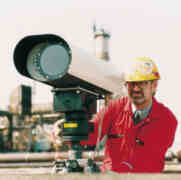UV Beam Identifies Invisible Air Pollutants

The Falcon system scans for up to 20 toxic substances
Air pollution used to be something you could see and smell. But as air quality standards have tightened, the air over most industrial sites, airports and cities has gradually cleared. Nevertheless, invisible toxic agents such as ethyl benzene, butadiene and styrene continue to pose risks to public health. With a view to detecting and quantifying these agents, Siemens Environmental Systems Limited in Poole, England has introduced UV Falcon. The system consists of a transmitter that projects a UV (ultraviolet) beam generated by a deuterium lamp across an open path of between 10 – 200 meters to a receiver. Based on the principle that gases have characteristic “spectral fingerprints,” or in other words absorption lines in the 200 – 300 nanometer UV range, the system uses a patented fourier transform spectrometer to scan the beam for up to 20 toxic and environmentally harmful gases in low parts per billion levels. Although the majority of applications are for fixed installations, the Environment Agency of England and Wales recently purchased a Falcon system for rapid mobile deployment.
Media Contact
All latest news from the category: Ecology, The Environment and Conservation
This complex theme deals primarily with interactions between organisms and the environmental factors that impact them, but to a greater extent between individual inanimate environmental factors.
innovations-report offers informative reports and articles on topics such as climate protection, landscape conservation, ecological systems, wildlife and nature parks and ecosystem efficiency and balance.
Newest articles
Faster, more energy-efficient way to manufacture an industrially important chemical
Zirconium combined with silicon nitride enhances the conversion of propane — present in natural gas — needed to create in-demand plastic, polypropylene. Polypropylene is a common type of plastic found…

Energy planning in Ghana as a role model for the world
Improving the resilience of energy systems in the Global South. What criteria should we use to better plan for resilient energy systems? How do socio-economic, technical and climate change related…

Artificial blood vessels could improve heart bypass outcomes
Artificial blood vessels could improve heart bypass outcomes. 3D-printed blood vessels, which closely mimic the properties of human veins, could transform the treatment of cardiovascular diseases. Strong, flexible, gel-like tubes…





















